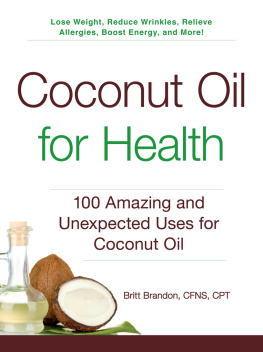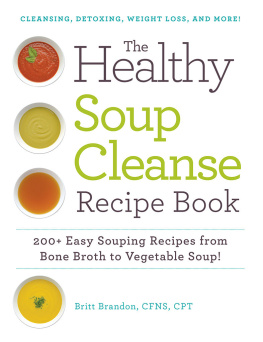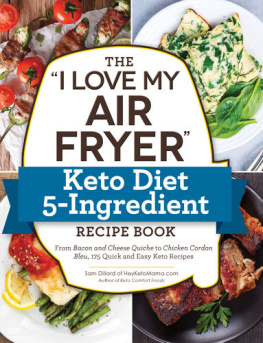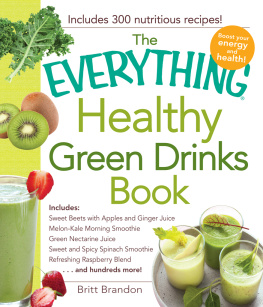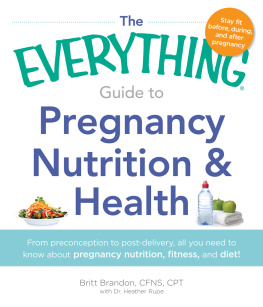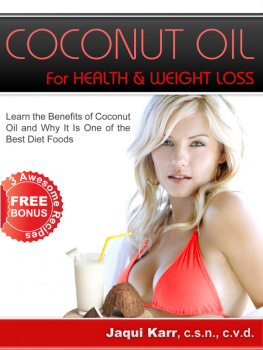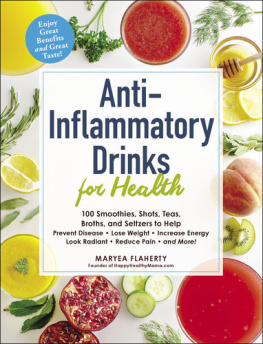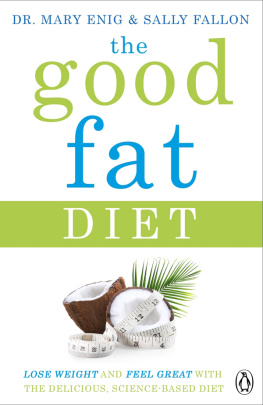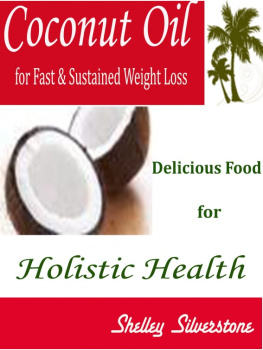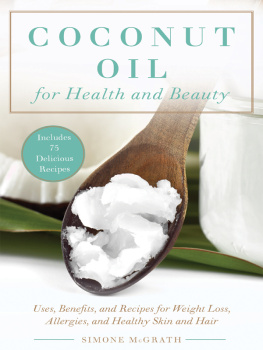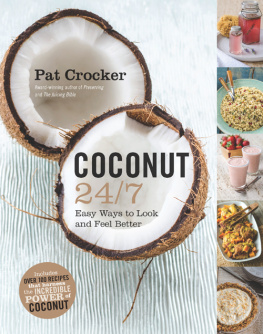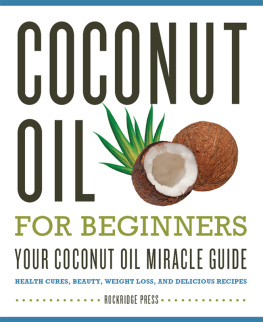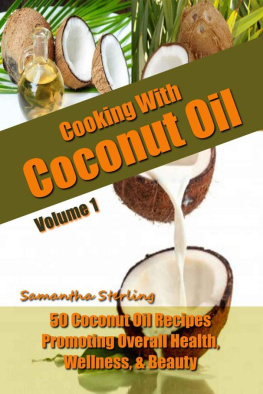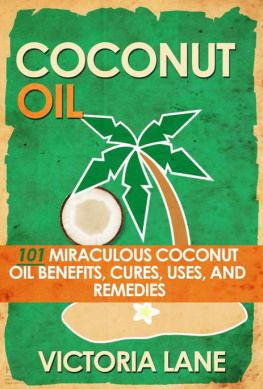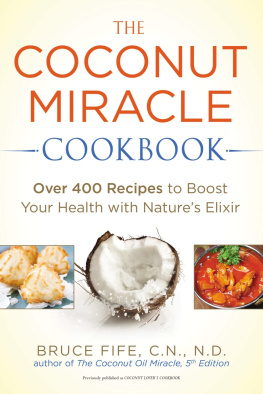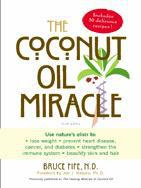Contents
Guide
Coconut Oil
for Health
100 Amazing and Unexpected Uses for Coconut Oil
Britt Brandon, CFNS, CPT

Avon, Massachusetts
CONTENTS
Dedication
For my amazing husband, Jimmy, and our three beautiful children, Lilly, Lonni, and JD, who make every day better than the last!
INTRODUCTION
If you heard about an all-natural product that could prevent and treat illnesses, one that actually worked and had an outstanding track record, wouldnt you want to learn more about it? What if this was a tried-and-true remedy that has been widely used by cultures around the world for centuries and prized for its effectiveness in combating countless physical ailments? But wait, theres more. In addition to its many health benefits, this product can make you more beautiful by doing everything from whitening your teeth and stimulating hair growth to nixing acne and speeding weight loss. If this sounds too good to be true, Im here to tell you that this product does existand its available at every major supermarket and health food store. It might even be in your kitchen cupboard right now. Whats this wondrous, magical elixir? Its coconut oil!
Modern medicine opts to treat and prevent every conceivable malady with pills, prescriptions, and procedures, but the recommended treatments, services, and medicines are often expensive, ineffective, or accompanied by undesirable or dangerous side effects. Although some medical breakthroughs are nothing short of miracles, we shouldnt rule out gentle, safe, effective natural healing products such as apple cider vinegar andyou guessed itcoconut oil. With its powerful antiviral, antibacterial, and antimicrobial properties, coconut oil can treat a host of health issues quickly, inexpensively, and without the risk of harmful side effects.
In this book, I show you how to use coconut oil to improve your life in 100 different ways. Ive even included a number of healthy recipes and body-care products you can make yourself. Whether youre looking for a quick energy lift, a way to lose weight, or relief from eczema or athletes foot, coconut oil can offer a solution. It can improve your sleep, digestion, and vitality as well. Coconut oils health-boosting properties can safely treat internal and external issues by combating germs, bacteria, and viruses. By enhancing the quality of your life in numerous ways, coconut oil can let you live each and every day with less illness and stress. Thats why I created this book: to show you an astounding number of easy and effective ways coconut oil can dramatically improve your life.
If youre ready to let coconut oil help you enjoy a healthier, happier, better life, then lets get started!
COCONUT OILS MANY HEALTH BENEFITS
Despite their name, coconuts arent nuts. Theyre actually the fruit (scientifically termed drupes) that drops from the lovely palm fronds atop the beautiful coconut palms inhabiting tropical areas of the world. Named by sixteenth-century Spanish settlers, coconut derives from the Spanish word coco, used to refer to the skull. They coined the term because they thought the three indentations on the coconuts fibrous outer coating resembled a skulls two eyes and nose.
Originating in the tropical landscapes of Florida and the numerous tropical islands around the world, coconut palms provide us with a plentiful crop55 million tons per year. Coconuts actually account for up to 60 percent of some Pacific cultures diets. In economic trade, medicinal treatments, and nutrition, the coconut has established itself as one of the most important natural resources known to humankind.
The History of Coconut Oil
Coconut fossils dating back 55 million years have been discovered in parts of Australia and India, yet earlier fossils found in parts of the Americas lead some researchers to theorize that South America and southern North America may have been the coconut palms birthplace. The coconuts ability to germinate even after the fruit has traveled the earths oceans for 100 days or over 3,000 miles has made it difficult to determine where the coconut originated. Regardless of the coconuts birthplace, its importance in myriad cultures throughout time is evident in multiple written works dating back 1,500 years.
Although Pacific cultures had utilized coconut oils medicinal powers for centuries, the Americas only learned of its healing properties in the mid-eighteenth century. Coconut oils ability to combat bacteria, fungi, viruses, parasites, and microbes quickly made it a commodity of high demand in the Americas. In only a few decades after its introduction in the early 1900s, the oils popularity skyrocketed. Finding the best method for extracting and processing the oil quickly became a focus for manufacturers worldwide.
Two methods were identified for developing coconut oil: dry and wet. The dry process involved drying the meat of the coconut using heat, sunlight, or chemical solvents, followed by pressing the oil directly from the meat. The wet process compressed the coconut meat to expel the liquid and then separated the oil from the water via fermentation, boiling, or various chemical processes. Because the wet process required the use of heavy machinery, was more expensive, and often resulted in a lower yield, the dry process became the more common procedure used to produce coconut oil. Once the chemical solvents in the manufacturing process were replaced with natural treatment alternatives that were not exorbitantly expensive, the dry process became even more appealing to manufacturers. To this day it remains the go-to process for extracting and developing coconut oil.
The Unique Fat in Coconut Oil
Because of its high saturated-fat content, coconut oil was once thought to be unhealthy. However, researchers studying its unique properties stumbled upon an important difference between coconut oil and other high-saturated-fat foods. They discovered that coconut oil contains a unique type of saturated fat, classified as lauric acid, to which the body responds differently than it does to any other saturated fat.
Lauric Acid
Lauric acid is found in other natural sources, such as breastmilk. This twelve-carbon fatty acid is enzymatically digested, shuttled straight to the liver, and metabolized into a monoglyceride called monolaurin. During the digestive process, coconut oils lauric acid increases energy levels and stamina, and boosts good cholesterol (HDL) levels. In addition, lauric acid and monolaurin act as antibacterial, antifungal, antiviral, and antimicrobial agents that potentially safeguard against common illnesses and ailments of the viral, bacterial, fungal, and microbial sort.
Different Types of Fatty Acids
Fatty acid chains of different lengths affect the body differently. Fats are classified in two ways:
- By the type of saturation
- By the length or size of the fatty-acid chain
Saturation is further broken down into different categories: saturated, monounsaturated, polyunsaturated, etc. The classification is used to describe the type and number of bonds that make up the fat molecule. The length of the fatty acids carbon chain of carbon and hydrogen atoms is what determines a fats classification as a short-chain fatty acid (SCFA), medium-chain fatty acid (MCFA), or long-chain fatty acid (LCFA). Long-chain fatty acids are found in animal and dairy productstheyre the ones that can contribute to the buildup of plaque in arteries, increased LDL cholesterol, etc. Coconut oil is composed of medium-chain fatty acids or medium-chain triglycerides (MCTs), which help the body rather than harming it.

